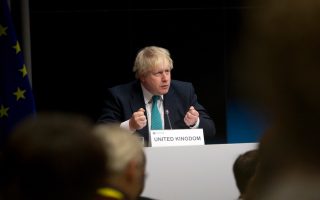Beyond enduring: Merkel’s new European ambition

In his thought-provoking new book on the state of the European project, Bulgarian writer Ivan Krastev quotes the poet Rilke: “Who speaks of victory? To endure is all.” With a view to the European Union’s prospects, Krastev adds, “But even enduring will not be easy.” Seen from Athens, this will certainly resonate – and for good reasons. But seen from Berlin and Paris, things are starting to look brighter.
Here, 2017 is shaping up to be an unexpectedly good year for those invested in the European project. The real existing populism of Trump and the disastrous British management of Brexit have had a deterrent effect on electorates. The political center is re-energized and has even taken to the streets in the Pulse of Europe movement. In France, President Emmanuel Macron demonstrated that with guts and luck, you can win a majority for a social-liberal reform project. Even more importantly, he found a formula against illiberal nationalism by combining French patriotism with a strong pro-European outlook. With Macron tackling overdue domestic reforms and pursuing an ambitious agenda for Europe, this makes him a very strong partner for the new German government that will form after the elections in September.
Germans are likely to vote for a centrist government that combines a generally pro-European outlook with skepticism about a transfer union within the eurozone. A left-wing coalition of Social Democrats (SPD), Greens and the Left Party looks very unlikely. Currently, it is far from achieving a solid majority (given the extreme views of some Left Party MPs, such a coalition would need a sizable majority to be capable of acting on foreign policy and NATO). Angela Merkel’s Christian Democrats are currently polling far ahead of Martin Schulz’s SPD. Therefore, another Merkel-led government looks likely. And even if Schulz were to lead a government, it would have a broadly similar outlook. Schulz may be bolder on some eurozone issues but would need to find compromises with either the Christian Democrats or the Liberal Party as coalition partners.
Merkel will likely be more ambitious on Europe in her fourth term than previously. Until now, she has mostly contented herself with EU crisis management. Recently, she has increasingly warmed up to going beyond that. She talks in more emotional terms about the European project. And this seems to be more than just a tactical move to prevent her challenger Schulz from branding her as not sufficiently pro-European. After her first meeting with President Macron in Berlin, she referred to the “treasure” that is the European project and to the current “sensitive historical moment” that calls for “a strengthening and consolidation of Europe.” In a recent conversation with a school class she talked about “sensing what kind of fascinating Europe can develop” and resolved to “more strongly consider the wishes and dreams of young people” in her policies. By Merkel’s standards, this is as poetic as it gets.
Merkel will continue to govern in prose but with a much greater French-German investment in European defense and foreign policy. She paved the way for that when stating that in the age of Trump, Europe needs to takes its own fate into its own hands. Germany and France will lead the way in a flexible, multispeed Europe.
On the eurozone, Merkel has expressed openness to reforms, including some involving treaty changes. She is open to a eurozone budget that allows eurozone members to fund necessary investments. The details remain contested but anything that smacks of a transfer union and Eurobonds will not be politically feasible in Germany. So for Greece, Merkel’s new European ambition will mean much-needed debt relief and some more joint investment funds. That may be far from victory, but will make enduring easier.
* Thorsten Benner (@thorstenbenner) is director of the Global Public Policy Institute (GPPi) in Berlin.





